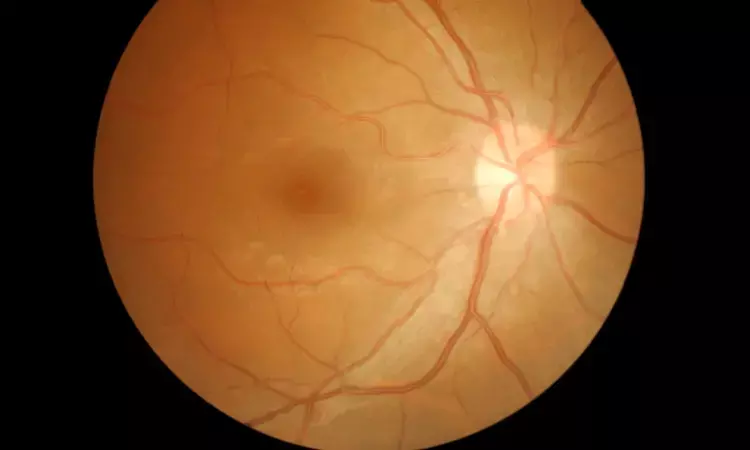- Home
- Medical news & Guidelines
- Anesthesiology
- Cardiology and CTVS
- Critical Care
- Dentistry
- Dermatology
- Diabetes and Endocrinology
- ENT
- Gastroenterology
- Medicine
- Nephrology
- Neurology
- Obstretics-Gynaecology
- Oncology
- Ophthalmology
- Orthopaedics
- Pediatrics-Neonatology
- Psychiatry
- Pulmonology
- Radiology
- Surgery
- Urology
- Laboratory Medicine
- Diet
- Nursing
- Paramedical
- Physiotherapy
- Health news
- Fact Check
- Bone Health Fact Check
- Brain Health Fact Check
- Cancer Related Fact Check
- Child Care Fact Check
- Dental and oral health fact check
- Diabetes and metabolic health fact check
- Diet and Nutrition Fact Check
- Eye and ENT Care Fact Check
- Fitness fact check
- Gut health fact check
- Heart health fact check
- Kidney health fact check
- Medical education fact check
- Men's health fact check
- Respiratory fact check
- Skin and hair care fact check
- Vaccine and Immunization fact check
- Women's health fact check
- AYUSH
- State News
- Andaman and Nicobar Islands
- Andhra Pradesh
- Arunachal Pradesh
- Assam
- Bihar
- Chandigarh
- Chattisgarh
- Dadra and Nagar Haveli
- Daman and Diu
- Delhi
- Goa
- Gujarat
- Haryana
- Himachal Pradesh
- Jammu & Kashmir
- Jharkhand
- Karnataka
- Kerala
- Ladakh
- Lakshadweep
- Madhya Pradesh
- Maharashtra
- Manipur
- Meghalaya
- Mizoram
- Nagaland
- Odisha
- Puducherry
- Punjab
- Rajasthan
- Sikkim
- Tamil Nadu
- Telangana
- Tripura
- Uttar Pradesh
- Uttrakhand
- West Bengal
- Medical Education
- Industry
Razumab both safe and cost-effective for managing retinopathy by prematurity

India: A study published in the Indian Journal of Ophthalmology has concluded that Razumab may be safely used in managing ROP by retina physicians globally. They confirmed it to be safe and cost-effective. They also added that more data will be available to corroborate findings when the use becomes widespread.
In this study entitled, "Efficacy of a biosimilar ranibizumab monotherapy for the treatment of retinopathy of prematurity", researchers have evaluated the efficacy of biosimilar ranibizumab (Razumab) on outcomes of retinopathy of prematurity (ROP) for the first time.
The infants presenting with stage 3+ ROP either in zone 1 or zone 2 posterior or aggressive posterior ROP (APROP) were included in the study and received intravitreal razumab (0.25 mg/0.025 ml) monotherapy.
Follow-up was continued monthly till complete retinal vascularization was achieved, while retreatment with razumab was given when recurrent neovascularization was noted. In case of no recurrence but incomplete vascularization, laser photocoagulation was done to the residual avascular retina.
The study results could be summarised as follows:
- In total, there were 118 eyes of 59 infants.
- The median gestational age and median birth weight were 30 weeks and 1250 grams, respectively.
- Twenty-eight eyes constituting 24 %, had APROP in 14 babies.
- Stage 3 disease was seen in zone 1 in another 28 eyes constituting 24%, and the remaining 62 eyes, constituting 52%, had stage 3 ROP in zone 2 posterior region.
- Twenty-two eyes had complete ROP resolution and complete vascularization at 55 days median.
- Forty-two eyes constituting 35%, had recurrent neovascularization at a median of 51 days post-razumab.
- The cumulative incidence of recurrence of neovascularization (21%) peaked at seven weeks and was significantly higher in eyes with APROP (43%) than in eyes without APROP (13.4%).
They concluded that based on our study's results, the safety and effectiveness of Razumab treating ROP is confirmed, with about a third requiring reinjection at seven weeks following the first dose.
The study's drawbacks are its retrospective nature and lack of a comparison group with the innovator ranibizumab.
The study's advantages are the large sample size and the use of widefield retinal imaging to monitor ROP and make more objective decisions.
Further reading:
Prajapati V, Choudhary T, Chauhan W, Shah S, Handa R, Jahan B, Malviya S, Sengupta S. Efficacy of a biosimilar ranibizumab monotherapy for the treatment of retinopathy of prematurity. Indian J Ophthalmol. 2023 Feb;71(2):411-415. doi: 10.4103/ijo.IJO_973_22
BDS, MDS in Periodontics and Implantology
Dr. Aditi Yadav is a BDS, MDS in Periodontics and Implantology. She has a clinical experience of 5 years as a laser dental surgeon. She also has a Diploma in clinical research and pharmacovigilance and is a Certified data scientist. She is currently working as a content developer in e-health services. Dr. Yadav has a keen interest in Medical Journalism and is actively involved in Medical Research writing.
Dr Kamal Kant Kohli-MBBS, DTCD- a chest specialist with more than 30 years of practice and a flair for writing clinical articles, Dr Kamal Kant Kohli joined Medical Dialogues as a Chief Editor of Medical News. Besides writing articles, as an editor, he proofreads and verifies all the medical content published on Medical Dialogues including those coming from journals, studies,medical conferences,guidelines etc. Email: drkohli@medicaldialogues.in. Contact no. 011-43720751


